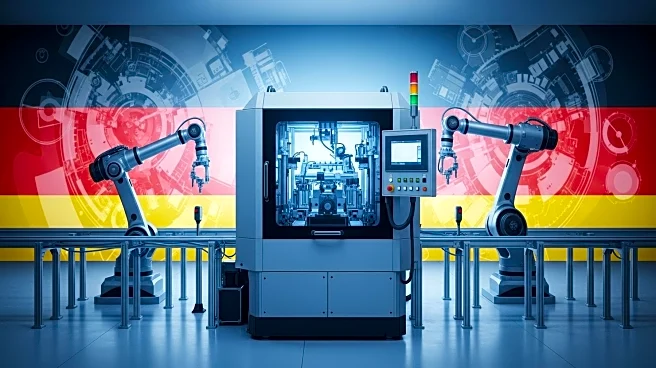What's Happening?
Rheinmetall has inaugurated a new 155 mm artillery shell plant in Unterlüß, Germany, on August 27. The facility, known as Werk Niedersachsen, is expected to produce up to 350,000 rounds annually starting in 2027. The plant began test production in the second quarter of 2025, following a groundbreaking ceremony in February 2024 attended by key figures such as then German Chancellor Olaf Scholz and German Minister of Defence Boris Pistorius. The plant covers an area of approximately 30,000 square meters and includes a shell production line as well as a loading, assembly, and packaging line. Additionally, a facility for rocket motors and potentially warheads is under construction, which will support Germany's planned rocket artillery project.
Why It's Important?
The opening of this plant marks a significant expansion in Rheinmetall's production capabilities, positioning it as a major player in the European defense industry. The facility is set to become one of the largest ammunition plants in Europe, potentially impacting the global arms market. This development is crucial for Germany's defense strategy, as it enhances the country's ability to produce artillery ammunition domestically, reducing reliance on external suppliers. The plant's operations are expected to boost the local economy by involving other companies and creating jobs. Furthermore, the production of rocket motors and warheads aligns with Germany's strategic military projects, potentially influencing defense policies and international relations.
What's Next?
As the plant ramps up production, Rheinmetall will likely focus on meeting the growing demand for artillery ammunition in Europe and beyond. The completion of the rocket motor and warhead production facility will further enhance Germany's military capabilities. Stakeholders, including the German government and defense contractors, will be closely monitoring the plant's output and its impact on the defense supply chain. The expansion may also prompt discussions on defense spending and international arms agreements, as Germany strengthens its position in the global arms market.
Beyond the Headlines
The establishment of this plant raises questions about the ethical implications of increased arms production in Europe. As countries invest in military capabilities, there is a need to balance defense needs with international peace efforts. The plant's operations could also influence environmental policies, given the potential impact of large-scale ammunition production on local ecosystems. Additionally, the involvement of local businesses in the plant's supply chain may lead to economic shifts in the region, affecting small and medium enterprises.









